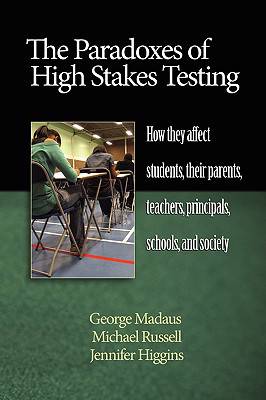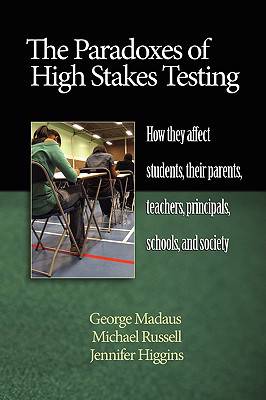
- Afhalen na 1 uur in een winkel met voorraad
- Gratis thuislevering in België vanaf € 30
- Ruim aanbod met 7 miljoen producten
- Afhalen na 1 uur in een winkel met voorraad
- Gratis thuislevering in België vanaf € 30
- Ruim aanbod met 7 miljoen producten
Zoeken
The Paradoxes of High Stakes Testing
How They Affect Students, Their Parents, Teachers, Principals, Schools, and Society (PB)
George Madaus, Michael Russell, Jennifer Higgins
Paperback | Engels
€ 46,45
+ 92 punten
Omschrijving
The book's goal is to clarify for parents, the public, and policy makers what high stakes tests are and how their use affects our schools, children, and society. It explores the various uses, limitations, and paradoxical consequences of high stakes testing. The present context of testing and the reauthorization of No Child Left Behind make the proposed book timely and important. Current testing programs provide valuable information to teachers, parents, and policy-makers about students, schools, and school systems. But paradoxically, these programs have unintended yet predictable negative consequences for many students, teachers, and schools. It is essential that the public and policy-makers understand the scope and impacts that result from the inherent paradoxical nature of high-stakes testing. Testing is viewed by policy makers across party lines as an "objective" measure of student attainment and has become their tool of choice to drive educational "reform" and hold children, teachers, schools, and districts accountable. Bipartisan support for test-based accountability is firm. For example, on January of 2005 President Bush called on Congress to extend NCLB testing in math and science to freshmen, sophomores and juniors citing poor performance among high school students as a "warning and a call to action." (NYT 01/ 13/05) Senator Kennedy, a critic of the President, nonetheless supported the President's proposed high school testing provisions.
Specificaties
Betrokkenen
- Auteur(s):
- Uitgeverij:
Inhoud
- Aantal bladzijden:
- 264
- Taal:
- Engels
Eigenschappen
- Productcode (EAN):
- 9781607520276
- Verschijningsdatum:
- 20/01/2009
- Uitvoering:
- Paperback
- Formaat:
- Trade paperback (VS)
- Afmetingen:
- 156 mm x 234 mm
- Gewicht:
- 371 g

Alleen bij Standaard Boekhandel
+ 92 punten op je klantenkaart van Standaard Boekhandel
Beoordelingen
We publiceren alleen reviews die voldoen aan de voorwaarden voor reviews. Bekijk onze voorwaarden voor reviews.











